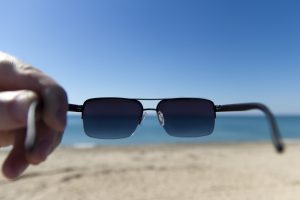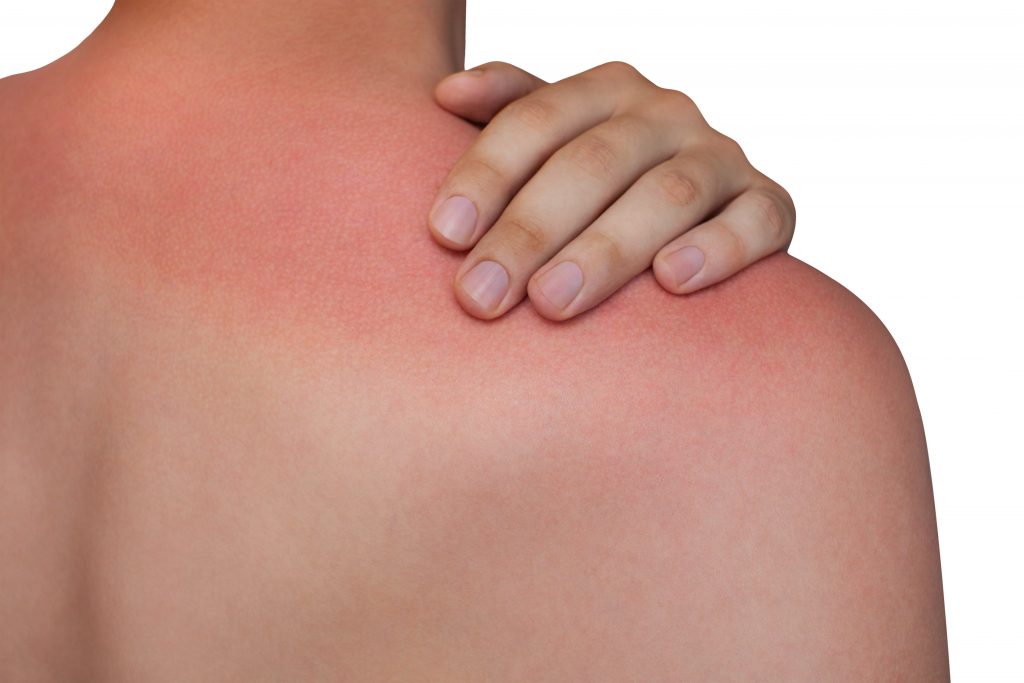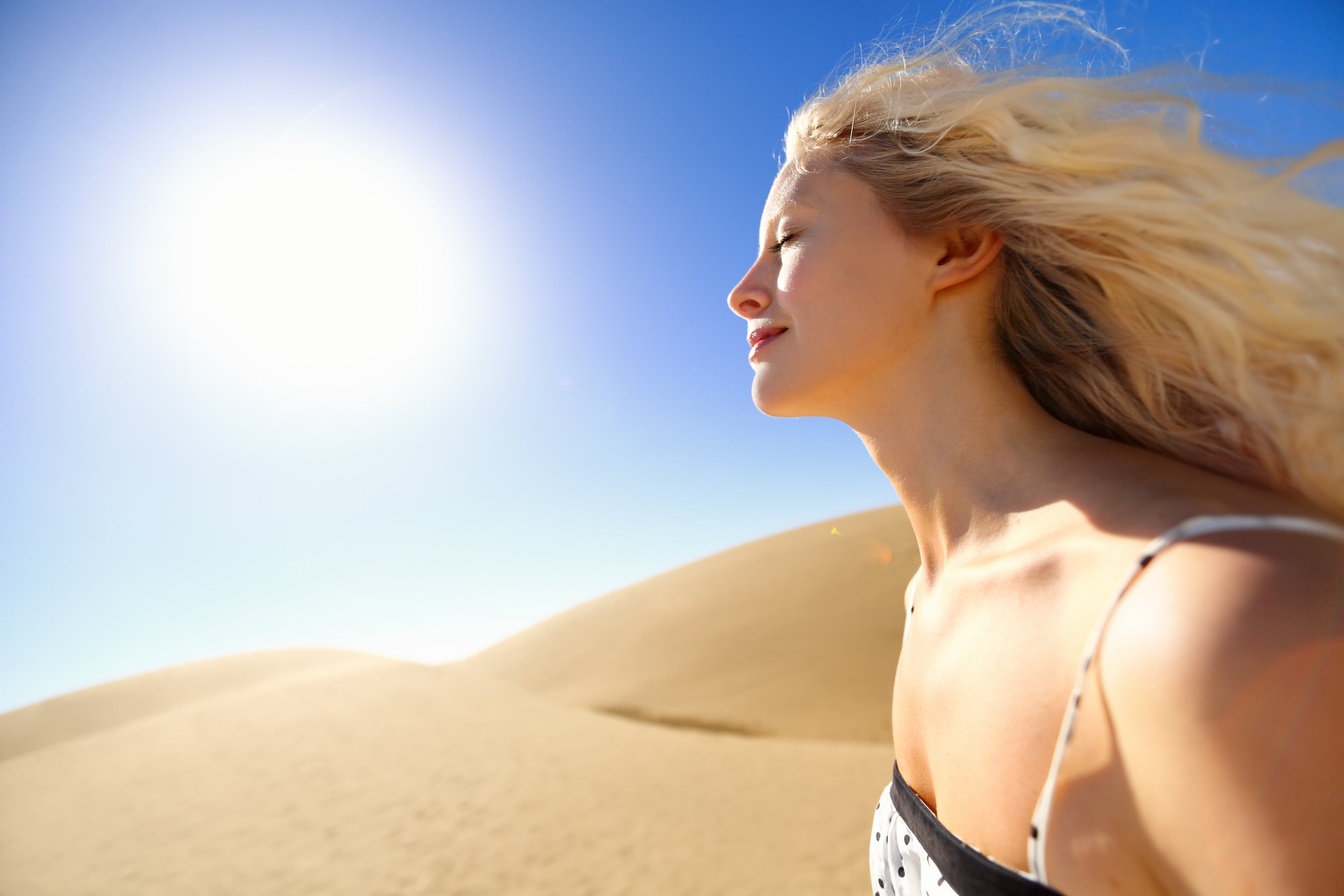Let’s start by making it clear that the sun is not an enemy. The sun is actually very important to our health. I’m sure you can even attest to the difference in your mood on a sunny day compared to a gloomy day. The sun helps us produce Vitamin D, a nutrient that plays an important role in bone health, mood, and immune health. But with the benefits of the sun comes risk as it can cause sun damaged skin.
While getting frequent small doses of sun exposure is good for your health, prolonged exposure is where sun damaged skin becomes a concern. With skin damage comes all of the issues that tend to bring fear with the very mention of them, like skin cancer or… premature aging.
Luckily, there are lots of ways we can protect our skin while still reaping the benefits the sun has to offer. Sunscreen tends to be the first form of protection that people think of. But before jumping to sunscreen, it should be noted that sunscreen is not the only, or even the best way to protect against sun damaged skin.
What You Need To Know To Protect Against Sun Damaged Skin!
Here are a few other simple and effective ways to protect your skin from prolonged sun exposure:

Wear A Hat
Preferably one that has a wide brim all the way around. This will protect your face and neck from the sun.

Hang Out In The Shade
Find a nice cool spot under a tree, tent, or umbrella. This will minimize your sun exposure if you’re going to be out all day.

Wear Sunglasses
This may be helpful for protecting your eyes against sun damage and also helps to prevent the wrinkles that form from squinting against the sun.
Okay, now that we’ve got the basics down, we may need a little extra protection for those nature lovers. Those who may be wanting to spend long, sunny, summer days out on the water for example. Also, for someone who works out in the sun all summer long. That’s where sunscreen can come in handy if used properly.
Here are some key things you should know before covering yourself in sunscreen.
It’s Not About The SPF!
A higher SPF can be misleading and can cause people to feel falsely protected from the sun’s rays (especially UVB rays) and spend too much time in the direct sun. A higher SPF often also means more chemicals to reach this SPF, which brings us to the next, very important point…
Know What’s In Your Sunscreen!
Our skin is our largest organ. It absorbs much of what we put on it. So, if you’re going to cover yourself in lotion, make sure its ingredients don’t do more harm than good.
As a general rule, I tell my patients that the primary ingredient in their sunscreen should be zinc oxide both for optimal protection and safety. Avoid sunscreens with oxobenzone or octinoxate. These chemicals have hormone disrupting potential and are being investigated as culprits in the bleaching of coral reefs (1). Click here for an important read on how, “Sunscreen is Damaging Coral Reefs – Everything You Should Know About It”.
Another ingredient to avoid that may not be so obvious is Vitamin A (often listed on the ingredient list as retinyl palmitate). While Vitamin A is typically good for your skin when consumed by eating fruits or vegetables, directly applying it to the skin, or consuming it in unnaturally high levels, can cause skin irritation or an increased sensitivity to the sun.
If you are questioning an ingredient in your sunscreen, ask an expert. The Environmental Working Group is another great resource for learning more about questionable sunscreen ingredients. Their Skin Deep app is a great tool for checking the safety of skin care products. Click here to read, “Best Sunscreen – Product Review”.

What Happens If Despite All Precautions, You Still Get Burned?
Don’t panic. Now it’s time to help your skin heal. One key way to support the healing process is to keep the skin hydrated. You can do this by drinking lots of water and applying oils, creams, salves, or gels to the skin.
There are also many herbs that help support the healing process. Commonly used herbs like Aloe vera are healing and cooling on sunburnt skin but lesser known herbs like Calendula (Calendula officinalis), Marshmallow (Althea officinalis) or Comfrey (Symphytum officinale) can also be helpful in soothing and healing sunburns. Click here for a video on making your own oil infusion for sunburns. Don’t forget to always check with your naturopathic doctor or herbalist before using any herbal medicine.
If you have any other questions about sun safety, skin health, vitamins etc. get in touch! I’d love to chat.
For further reading, click here to read “Enjoy the Sun in Small Doses”.
Sources
Siller A, Blaszak SC, Lazar M, Olasz Harken E. Update About the Effects of the Sunscreen Ingredients Oxybenzone and Octinoxate on Humans and the Environment. Plast Surg Nurs. 2018;38(4):158–61.
Environmental Working Group. “EWG’s 2019 Guide to Safer Sunscreens.” EWG, www.ewg.org/sunscreen/.
Felicia is a Naturopathic Doctor whose own healthcare experiences lead her to discover the benefits of naturopathic medicine. She earned her Bachelor of Science degree in 2013 at McMaster University, majoring in Biology & Psychology and completed an Honours thesis in behavioural neuroscience, investigating emotional regulation and mood disorders in adolescents. She then went on to earn her Doctor of Naturopathy degree at the Canadian College of Naturopathic Medicine in Toronto. In 2017, in her 4th year of post-graduate study, she completed a clinical internship at the Robert Schad Naturopathic Clinic, which included a pediatric-focused shift, a placement in the Queen West Community Health Centre, as well as a global clinical preceptorship in India.
Felicia’s Vision
Felicia aims to share knowledge and experiences gained on her own journey to help others on their health journeys. Gentle curiosity guides her practice and much time is spent in visits exploring symptoms and making connections to discover their root cause. Nutritional and lifestyle counseling are an important part of every treatment. Other tools Felicia uses to help ease symptoms and guide the healing process may include: acupuncture, botanical/plant medicine, homeopathy, and hydrotherapy. She also loves food and gardening and believes both are among the most powerful medicines.

